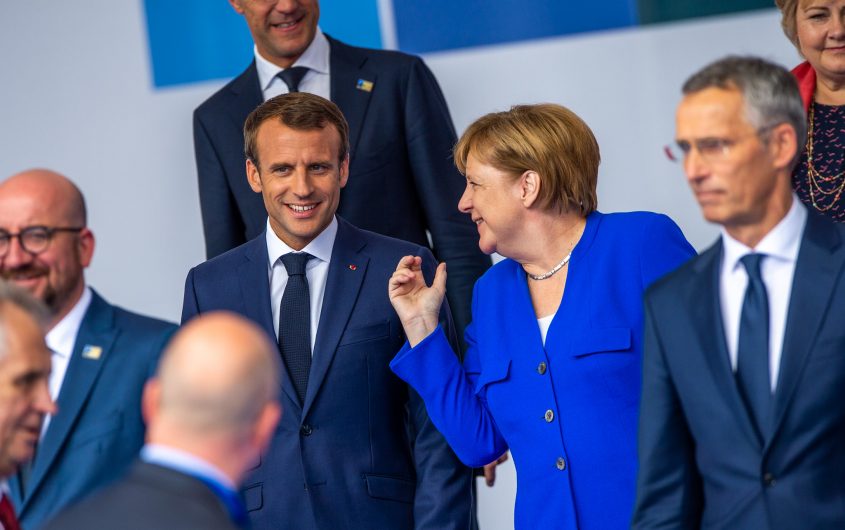
NATO via Flickr
The Franco-German Motor Revs Up

Peter S. Rashish
Vice President; Director, Geoeconomics Program
Peter S. Rashish, who counts over 30 years of experience counseling corporations, think tanks, foundations, and international organizations on transatlantic trade and economic strategy, is Vice President and Director of the Geoeconomics Program at AICGS. He also writes The Wider Atlantic blog.
Mr. Rashish has served as Vice President for Europe and Eurasia at the U.S. Chamber of Commerce, where he spearheaded the Chamber’s advocacy ahead of the launch of the Transatlantic Trade and Investment Partnership. Previously, Mr. Rashish was a Senior Advisor for Europe at McLarty Associates, Executive Vice President of the European Institute, and a staff member and consultant at the International Energy Agency, the World Bank, UN Trade and Development, the Atlantic Council, the Bertelsmann Foundation, and the German Marshall Fund.
Mr. Rashish has testified before the House Financial Services Subcommittee on International Monetary Policy and Trade and the House Foreign Affairs Subcommittee on Europe and Eurasia and has advised three U.S. presidential campaigns. He has been a featured speaker at the Munich Security Conference, the Aspen Ideas Festival, and the European Forum Alpbach and is a member of the Board of Directors of the Jean Monnet Institute in Paris and a Senior Advisor to the European Policy Centre in Brussels. His commentaries have been published in The New York Times, the Financial Times, The Wall Street Journal, Foreign Policy, and The National Interest, and he has appeared on PBS, CNBC, CNN, NPR, and the BBC.
He earned a BA from Harvard College and an MPhil in international relations from Oxford University. He speaks French, German, Italian, and Spanish.
At a joint videoconference on May 18, German chancellor Angela Merkel and French president Emmanuel Macron proposed a €500 billion Recovery Fund to help EU member states rebound from the economic crisis brought on by COVID-19. These funds would be in addition to the €540 billion emergency loan plan already put forward by Eurozone ministers (the Eurogroup), the European Commission’s €100 billion SURE employment guarantee scheme, and new European Investment Bank lending.
While the proposal still needs the approval of the other 25 EU member states, it is politically significant in three ways.
First, it signals a major shift in German thinking about EU economic and financial policy. The plan would provide grants to member states financed through borrowing by the European Commission, which would assume financial risk on behalf of all the member states. Until now, Chancellor Merkel’s government seemed to be aligning with countries like Austria, the Netherlands, and Denmark that wanted any recovery fund to take the form of loans that would have to be paid back and whose risk would be held by individual member states, not the EU as a whole.
Second, the proposal is a sign that the idling Franco-German motor—which has been chiefly responsible for creating European solidarity for the last 70 years—is revving up. Starting with the European Coal and Steel Community in 1950 and continuing through the European Monetary System in the 1970s and German reunification and the euro in the 1990s, a common approach from Berlin and Paris was the key to progress. To the political tandems of Helmut Schmidt-Valéry Giscard d’Estaing and Helmut Kohl-François Mitterrand it is now fair to add Angela Merkel-Emmanuel Macron.
Third, this proposal from Berlin and Paris helps to rebalance the EU’s policy instruments in a positive direction. The EU has taken a lopsided approach dominated by monetary policy to both the Eurozone debt crisis and the economic fallout from the coronavirus. Now a common EU fiscal policy is getting a needed boost. This step is all the more urgent in the light of the decision by the German Constitutional Court earlier in May that found the European Central Bank’s 2015 asset purchasing program may have overstepped its mandate. The Franco-German proposal helps take some of the political sting out the German court’s decision by showing that the ECB does not have to be the only game in town when it comes to economic crisis management.
While the Franco-German proposal is a turning point, it is not a revolution. Although on a more modest scale, the European Commission already engages in borrowing on behalf of all 27 member states to help them (as well a group of close EU partners) with economic and financial stabilization. And the plan from Berlin and Paris is limited in both scope and duration—it is a one-time boost to the next seven-year European Union budget in response to a specific emergency situation. The EU will not assume any existing or future national debt of the member states.
Only time will tell if the Franco-German proposal is an incipient Alexander Hamilton moment for the EU. The United States in 1790 is not the European Union in 2020. But it is a sign that the “de facto solidarity” put forward as a goal in the EU’s founding document may be emerging.








